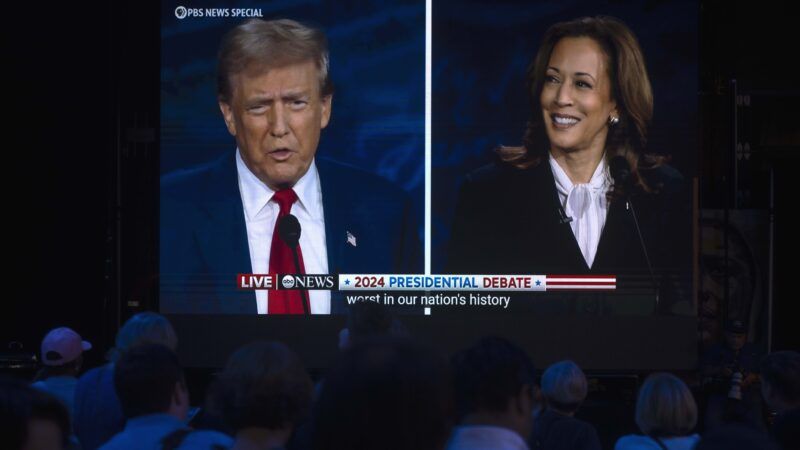The Trump-Harris Debate Featured Two Incumbents Afraid To Discuss Their Own Records
Two incumbents, both alike in indignity.

A lot of American politics has been upended over the past eight years, but here's one constant: a majority of Americans believe the government has too much power.
Gallup polls this question almost annually and the results are remarkably stable. In every poll since 2009, between 51 percent and 60 percent of the people Gallup surveyed said the government is too powerful, while less than 10 percent have said the government does not have enough power. Elections come and go, presidential administrations begin and end, and one of the few things that most of us seem to agree about is that the government should not have more power, no matter who runs it.
Those sentiments seem relevant to a key facet of last night's debate between former President Donald Trump and Vice President Kamala Harris, a pair of quasi-incumbents who are promising—in different ways—to give the government more power over the private decisions of people and businesses.
It would be foolish for either of them to talk about things in those terms, of course—just look at how that polls!—so instead we got a debate that largely pivoted on the candidates' attempt to distance themselves from the halls of power. Rather than incumbency being an advantage, both Trump and Harris seemed to enter the debate with a strategic goal of painting the other as the insider who can't be trusted with power. (In fairness, they are both probably right about that.)
That showed most clearly in Trump's closing statement—his most polished and practiced moment during a chaotic debate. "She's going to do all these wonderful things. Why hasn't she done it? She's been there for three and a half years," Trump said. "They've had three and a half years to fix the border. They've had three and a half years to create jobs and all the things we talked about. Why hasn't she done it?"
Trump's supporters walked away feeling like he should have done more of that. In comments to Politico after the debate wrapped, Sen. Lindsey Graham (R–S.C.) bemoaned Trump's missed opportunities to tie Harris to the unpopular Biden administration. "What I was hoping for was: 'When I left we had the most secure border in 40 years, mortgage rates were below three percent, gas was $1.87, the Abraham Accords, energy independent, you screwed it all up,'" Graham said.
Similarly, Harris was at her strongest when she was taking Trump to task for his track record in office. That was particularly true in the part of the debate focused on abortion, and when she criticized Trump's plan for higher tariffs, which Harris characterized (correctly) as a tax increase that would drive up the cost of everyday goods for American families.
Trump responded with his usual nonsense about how other countries are paying the tariffs—a completely untrue statement—but eventually landed one good counterpunch. "You know," he said, "if she doesn't like them, they should have gone out, and they should have immediately cut the tariffs."
It would have been nice to see to moderators hold Harris' feet to the fire on that one. Yes, why hasn't the Biden administration repealed Trump's tariffs? Unlike the abortion issue, that's something the president could do unilaterally.
Both candidates' weakest moments reflected this meta-debate over incumbency as well. During a discussion over health care policy, the moderators asked Trump whether he would seek once again to repeal the Affordable Care Act and what he would seek to replace it with. Trump gave a garbled response, promising to run Obamacare "as good as it can be run" until "we can come up with a plan" that would be better and less costly.
Then came the obvious follow-up: What's that plan going to be?
"I have concepts of a plan," Trump offered in response. But it's been nine years since Trump got into federal politics. How much longer should we have to wait?
Harris has a good debate, but her most glaring weakness was what she didn't talk about—the negative space created by her determination to keep the attention on Trump and say as little as possible about her own accomplishments or goals.
She promised to "chart a new way forward" but noticeably avoided talking about the path she's trod so far. "Bidenomics" has been memory-holed. The many big initiatives of the past four years—the CHIPs Act, Inflation Reduction Act, and infrastructure bill—hardly got a mention. The Biden-Harris administration has pushed government spending to dizzying new heights. Isn't there something to show for all that?
A sharper performance from Trump would have put her on the back foot more often. Instead, he was too eager to take the bait that she readily supplied.
It's not quite accurate to say that Harris and Trump behaved as if they were ashamed of their own records. When pressed, both put up token efforts at playing defense. But you certainly couldn't have watched Tuesday's debate and come away with the sense that either candidate was particularly enthusiastic or proud of what the federal government has done while they were at or near the top of the executive branch.
In less than two months, we'll know whether voters have chosen four more years of this or four more years of that. Regardless, it's a safe bet that only a tiny minority of Americans will support giving Trump or Harris more power. Tuesday's debate demonstrated why that's true.


Show Comments (11)